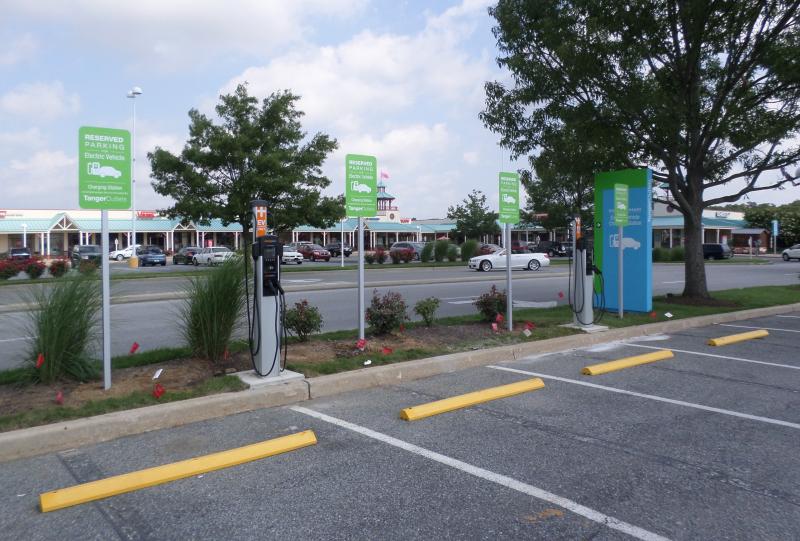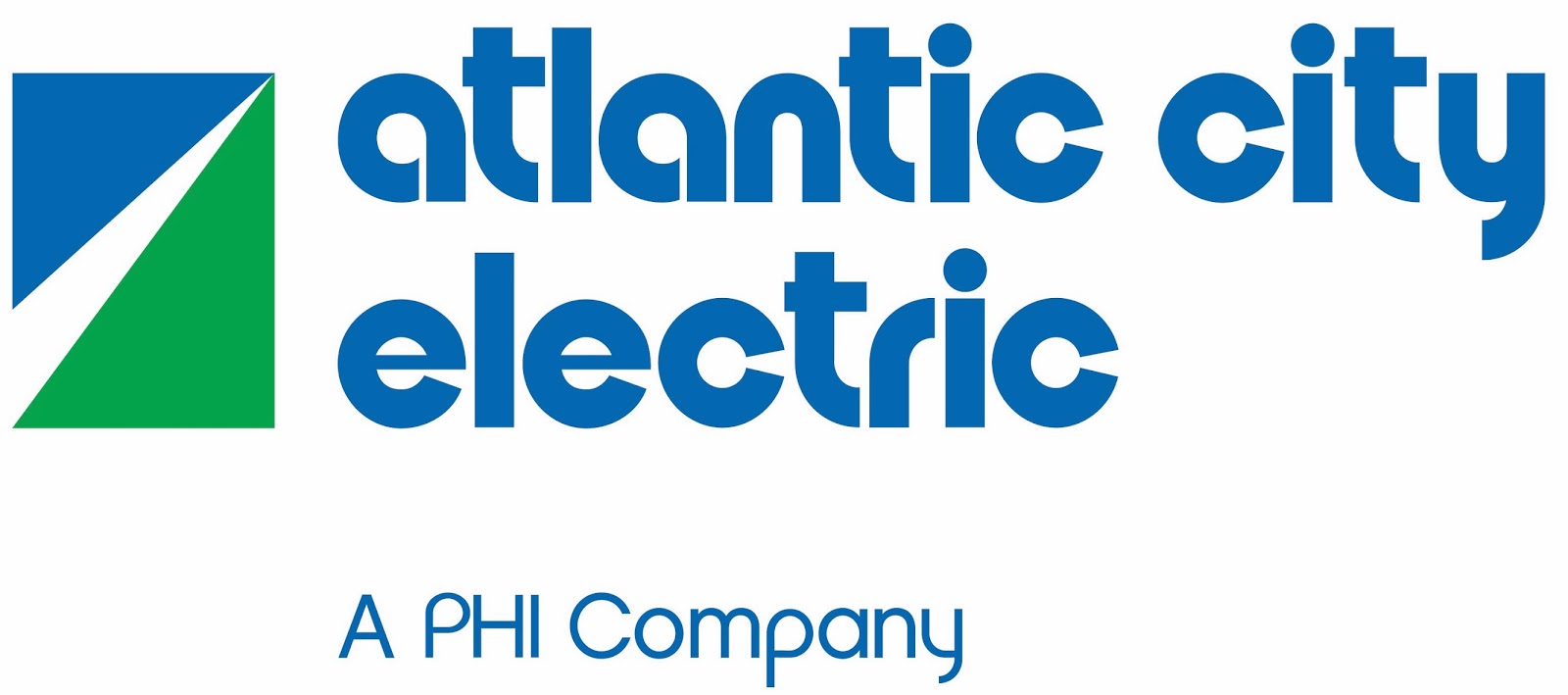Fuel-Cell Plant Headed to Siting Council

The Beacon Falls Energy Park, which was announced in May, will be built on part of 24-acre site near Lopus Road west of the Naugatuck River. The council will have 180 days to rule on the application.
The companies developing the plant have said the project will yield up to $90 million in local property and state sales taxes over the plant’s 20-year life. The Beacon Falls Energy Park will produce enough electricity to power more than 60,000 homes.
More: New Haven Register
DELAWARE
EV Outlets at the Outlets for Beachgoers

The charging stations are Level 1, which can provide 4 ½ miles’ worth of juice for a Nissan Leaf in an hour.
The Delaware outlets are among 23 Tanger locations nationwide providing the charging stations as part of the company’s effort to go green. It’s also looking into installing solar panels at its Rehoboth Beach locations.
More: Delaware Public Media
KANSAS
Report: Kansas Governor Asks Westar Exec for Cash

Kansas Gov. Sam Brownback’s campaign approached a Westar Energy official for cash earlier this month as part of an effort to pay down its debt. The Topeka Capital-Journal obtained documents that show a Brownback campaign operative contacted Westar Energy executive Mark Schreiber two weeks ago seeking help retiring debt left over from the governor’s re-election campaign last year.
The Kansas Corporation Commission is set to rule this fall on a $152 million rate request from Westar. The KCC is made up of three commissioners who are appointed by the governor and confirmed by the state Senate. If the request is approved, about $93 million would be raised from residential customers, amounting to a 12.1% increase.
Asked about the campaign’s decision to approach the Westar official, a governor’s spokeswoman said his office “does not influence the operations or decision-making process of the Kansas Corporation Commission, which is an independent commission.”
More: The Topeka Capital-Journal
Environmental Groups Allowed to Intervene in Westar Case
The Kansas Corporation Commission ruled last week that a variety of solar and environmental interest groups can intervene in a limited capacity in Westar Energy’s pending rate case before the commission. The KCC held two hearings last week to gather public input on Westar’s proposed $152 million rate-increase request.
At issue is Westar’s proposal to create three new optional service plans. The plans shift more of each monthly electric bill to fixed charges, increasing from $12 per month to $27 per month by 2019, and reducing volumetric charges based on consumption. The proposal prohibits renewable energy users from participating in at least one of the options, resulting in higher base rates while limiting the ability to lower the bills through conservation.
Westar said solar power activists, including some from out of state, are misrepresenting the utility’s “common-sense approach to renewable energy.”
More: The Topeka Capital-Journal; The Hutchinson News
MAINE
Texas Company to Build New England’s Largest Wind Farm

The Texas company is proposing to erect up to 119 turbines rated at between 2 and 2.1 MW. The cost of the project is $613 million. EDP has been working on the project for at least two years.
The project would also include a 50-mile transmission line to connect the wind farm to the ISO-NE power grid. In January, Central Maine Power and Emera agreed to allow EDP to use a portion of a key transmission corridor known as the Bridal Path, between Houlton and Haynesville in Aroostook County, to connect its wind farm to the grid.
More: Portland Press Herald
Town Drafting Solar Regulations
Winslow is set to begin drafting regulations that could pave the way for a solar farm potentially 20 times bigger than the largest current solar facility.
Ranger Solar, a private Yarmouth-based energy firm, is contemplating siting a 10- to 20-MW solar project estimated to cost as much as $25 million and take up as much as 100 acres. Winslow would be the first municipality in the state to create a utility-scale solar ordinance that would create standards for such projects, according to town officials.
The ordinance has to be in place by October so Ranger can take advantage of federal tax credits. The program provides a 30% federal income tax credit for commercial or residential solar systems, which will decrease to 10% after 2016.
More: Portland Press Herald
MARYLAND
Pepco Fights Back Against Motion to Stay Merger OK
Pepco Holdings Inc. says that a motion to stay the state’s approval of its merger with Exelon is without merit.
The motion was filed July 21 by the state Office of People’s Counsel in the Circuit Court for Queen Anne’s County. In addition to requesting a stay of the Public Service Commission’s decision, the People’s Counsel asked to present additional evidence regarding an alleged conflict of interest of former Commissioner Kelly Speakes-Backman, who took a $200,000/year job with an industry-backed nonprofit three days after the vote.
The merger still needs the approval of the D.C., which is set to make a decision next month.
More: StreetInsider.com
MASSACHUSETTS
Largest Solar Usage per Capita Eyed
With the opening of a 3.56-MW solar installation built over a capped landfill, North Adams will become the largest per capita solar city in Massachusetts, according to Mayor Richard Alcombright. The town, which also has a power-purchase agreement to buy electricity generated by two other solar installations, says the reduction in dependence on fossil fuel-produced power will save the community more than $300,000 a year.
The solar farm at the landfill consists of about 7,000 solar panels covering about 13 acres. It is producing at 65% of its capacity because the National Grid substation in Adams isn’t equipped to handle all its output. The utility company is upgrading the substation, Alcombright said.
The city is contemplating building another 1-MW project, but officials say it will wait until net metering caps are lifted by the state.
More: Berkshire Eagle
MISSOURI
Ameren Energy Efficiency Hearings Begin Before PSC

State law allows utilities to bill customers to recoup the costs of the efficiency programs and sales lost due to energy savings, but it doesn’t require utilities to participate. Ameren has indicated it does not like how the public counsel and the PSC staff want to structure the program. The state’s utility customer advocate told regulators eliminating energy efficiency rebates for Ameren customers would be better than adopting the utility’s new efficiency plan.
The Natural Resources Defense Council, which has been a critic of what it said were low savings targets in the utility’s prior proposal, is now backing Ameren’s plan. Other environmental groups have sided with PSC staff and public counsel.
More: St. Louis Post-Dispatch
MONTANA
Rate Hike Would Cover Upgrades that may Have Been Unneeded
Montana Dakota Utilities spent hundreds of millions of dollars on environmental upgrades at plants to comply with federal emissions standards that are now being challenged. If the federal Mercury Air Toxic Standards, or MATS, is successfully challenged, it might mean that the utility’s improvements were unnecessary.
MDU has applied for a 21% rate increase to pay for the upgrades. Residential bills may rise $178 a year to cover the pollution controls. But the utility says the upgrades, which cost about $348 million for one plant alone, were mandated to meet the mercury standards, which are still in force. “The rule is still in effect,” MDU Spokesman Mark Hanson said. “We still have a deadline to meet. It’s tough to run your business when you don’t know what the rules are.”
The Montana Public Service Commission has not yet granted the increase. “Twenty-one percent is a large increase, and it’s very rare to see an increase from our large utilities that’s in the double digits,” Commissioner Travis Kavulla said.
More: Billings Gazette
NEBRASKA
Nebraska’s Wind Energy Catching Up with Other States
Timothy Texel, executive director and general counsel of the Nebraska Power Review Board, says the state had only three wind turbines generating 2 MW of power when he first joined the regulatory body in 1998. Speaking to the Grand Island Rotary Club last week, Texel said Nebraska now has 475 wind turbines capable of generating 801 MW at 16 separate wind farms.
“We have more wind turbines than people think, but they’re mostly in remote location where people never see them,” he said. Texel said recent regulatory changes have allowed private entities to build “energy export facilities” that can generate power for utilities in other states. He said the expense of building transmission lines is an issue — only one such line has been built since 2010 — but SPP’s cost-allocation process could lead to power being exported through the RTO.
More: The Grand Island Independent
Lincoln Wind Project Gets OK from County Board
The Logan County Board approved a $400 million wind project after the owners made changes to address earlier board concerns.
The Meridien Project, an 81-turbine wind farm, is being built by Relight U.S. The board deadlocked 6-6 when it voted on the project initially. The new plan addresses noise levels, increases setback distances, pays out more money for community projects and sets up a decommissioning plan. The board voted 8-4 to approve it this time.
The project has been in the planning stages since 2007. One board member said she hoped the latest vote would allow all residents to move forward. “I would encourage everyone on both sides to really put the differences behind and to move forward and not let this have a long time of festering, because that would be a negative for the entire community,” she said.
More: Pantagraph
NEW HAMPSHIRE
Renewables Fund Going Broke

The fund had only collected $4.3 million in 2014 to pay for 2015 projects. Adding to the stress on the fund was a decision by legislative budget writers to raid the fund for $2.2 million over the next two years to make up the amount the now closed Vermont Yankee nuclear plant paid to finance the state Department of Homeland Security.
More: New Hampshire Union Leader
NEW JERSEY
Regulators Investigate Utility Storm Response

The “macroburst” thunderstorms brought winds of up to 85 mph in Gloucester and Camden counties, hitting customers of Atlantic City Electric hardest and causing extensive damage to the utility’s infrastructure, according to the BPU.
The company reported that 17 transmission circuits and five substations were knocked out of service. The utility, owned by Pepco Holdings, had to replace transmission towers and distribution poles and rebuild thousands of feet of cable. For at least twelve hours after the storm hit, ACE was forced to revert to radios and manual processes to dispatch crews, as its mobile-data terminals failed.
More: NJSpotlight
NEW YORK
Report Faults LIPA Reform Act
New York’s top fiscal officer criticized Gov. Andrew M. Cuomo’s 2013 LIPA Reform Act in a report that says the law has left customers facing higher electric bills, increasing debt and less transparency from the utility.
State Comptroller Thomas DiNapoli raised questions about provisions in the law and PSEG Long Island’s contract to manage the distribution company, which stripped away mechanisms for oversight of the utility even as it created a new oversight agency — the Long Island office of the state Department of Public Service.
DiNapoli’s report found that LIPA customers now are facing higher bills “with new categories of charges as well as a proposed three-year rate increase, and bearing a debt burden that is projected to increase” to $8.3 billion by 2018. The report notes that the proposed 3.2% three-year rate hike by PSEG and LIPA “represents the largest rate increase LIPA ratepayers have faced” since LIPA took over from LILCO in 1998.
More: Newsday
NYISO Board Approves Comprehensive Reliability Plan
The NYISO Board of Directors has approved the 2014 Comprehensive Reliability Plan for New York’s bulk power system. The plan concludes that the system will meet all applicable reliability criteria under expected system conditions during the study period (2015-2024), and confirms that the reliability needs initially identified in the 2014 Reliability Needs Assessment are being resolved. (See NYISO: Reliability Concerns Raised Last Year Resolved.)
“The NYISO’s comprehensive planning process works in conjunction with our markets that are designed to send price signals for entry of resources that sustain and enhance reliability,” NYISO President and CEO Stephen G. Whitley said in a statement. “The new capacity zone in the Lower Hudson Valley played a critical role in motivating suppliers to maintain existing resources and install new resources needed for system reliability.”
More: NYISO
NYPA Driving Economic Force
The New York Power Authority is playing a growing role in the Buffalo Niagara region’s economic development. The Power Authority is providing most of the $5 million funding for the 43North business plan competition, which announced recently it had attracted more than 3,000 qualified entrants.
Similar initiatives, some stemming from the agency’s 2007 relicensing agreement for the Niagara Power Project, have helped fund the Canalside project and subsidize dozens of local businesses through allocations of low-cost hydropower from the Lewiston plant.
“Think of it as a dividend,” Gil C. Quiniones, the Power Authority’s president and CEO, said during a meeting with editors and reporters of The Buffalo News.
More: Buffalo News
NORTH CAROLINA
Target Plans to Build 27 Solar Projects on Stores
Target filed an application to install solar arrays on eight more stores in North Carolina, bringing its total to 27 rooftop solar projects in the state.
According to filings with the North Carolina Utilities Commission, Target plans to invest about $22 million to complete the installations.
More: Charlotte Business Journal
NORTH DAKOTA
Pipeline Company Changes Route to Reduce Environmental Impact
The North Dakota Public Service Commission has approved 29 changes to a crude-oil pipeline route to reduce possible environmental impacts.
Sacagawea Pipeline Co. applied in March for approval of a 16-inch crude-oil pipeline that would run from McKenzie County to a rail terminal in Montrail County. Part of the $100 million pipeline will cross Lake Sakakawea. The company appeared before the commission last week to file for the changes, which it said were designed to minimize any environmental impacts.
The pipeline has a maximum capacity of 200,000 barrels a day.
More: Dickinson Press
PENNSYLVANIA
Ethane Plant Would Produce Its Own Electricity

The plant, proposed for Beaver County, would use natural gas-fired cogeneration on-site to create steam and electricity, with any excess power to be sold for use on the regional grid.
Shell, which paid $13.5 million for the former zinc smelting site, has not confirmed it will build the multi-billion-dollar facility.
More: Associated Press
TEXAS
Entergy Texas Withdraws from Union Power Deal

Union Power is a 1,980-MW generating facility consisting of four combined-cycle natural gas-fired generating units. Under the original agreement, Entergy New Orleans agreed to buy 20% of the power generated by the two natural gas-fired units purchased by Entergy Gulf States. The company will purchase one of the Union Power Station units in lieu of the purchased power agreement. Entergy Gulf States will still purchase two of the generating unit and Entergy Arkansas will buy the remaining unit.
While New Orleans Entergy customers will now absorb a larger share of the purchase’s cost, Entergy New Orleans President and CEO Charles Rice said the deal “is an ideal way” to meet the city’s need for additional generation at “half the cost of building a comparable new unit.”
More: The Times-Picayune
MANITOBA
Manitoba Hydro Granted 4% Rate Hike by PUB

Bipole III is a $4.6 billion transmission line project designed to deliver power from northern generating stations to southern Manitoba and for export to the United States.
Manitoba Hydro said it is on track to spend about $20 billion over the next 10 years on system improvements, including the Bipole III project. The utility said it would need to increase rates nearly 42% over the next 10 years to finance the improvements.
More: Metro News; Winnipeg Sun


